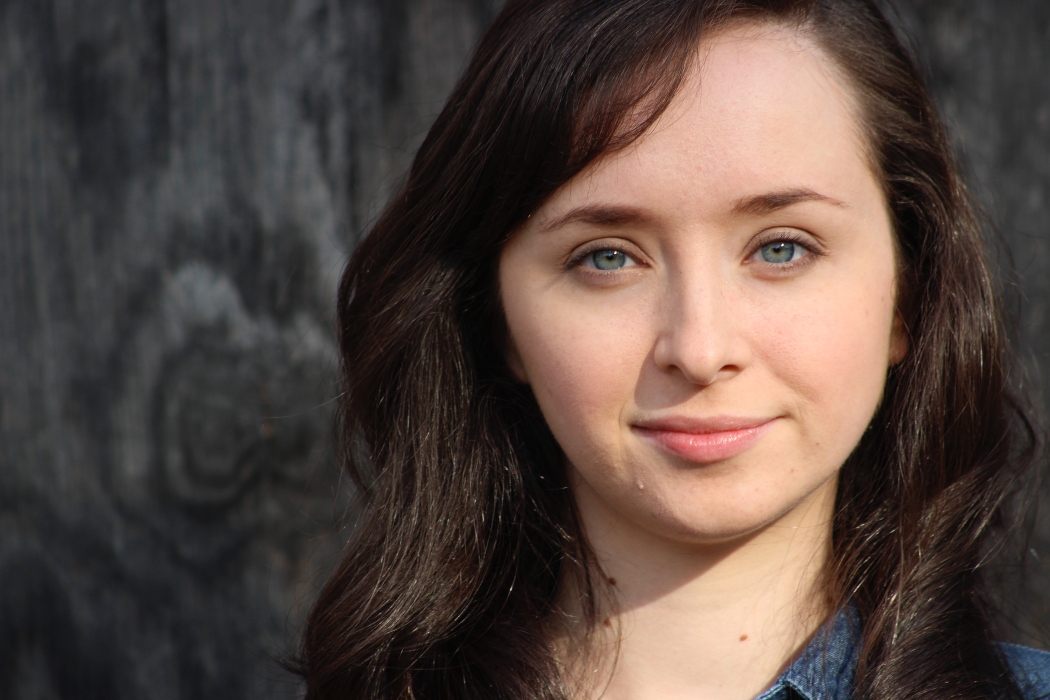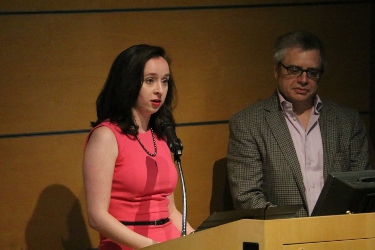A Conversation with Marian Mitchell Donahue, English alumna

Marian Mitchell Donahue graduated from Catholic University in 2013 with a B.A. in English and a minor in International Politics. Since then, she has gone on to complete an M.F.A. in Creative Writing and Literature at Stony Brook University in Southampton, NY, where she was also awarded the 2017 Deborah Hect Memorial Prize in Fiction.
Why did you choose to study English?
I chose to study English because I enjoyed learning about literature and composition even when I wasn't very good at it. It's important when choosing a major to pick an area of study that will hold your interest through success and failure, not just through success. I love studying English and that love got me through the difficult parts of my Thesis and Comps.
How did you decide that an M.F.A. program was the right path for you? Did you know what you wanted to do before you graduated from Catholic?
I knew I wanted to study Creative Writing when I graduated from Catholic, but I didn't know exactly where that would take me. By graduation I had only just started building my own creative voice and writing practice. So I worked, waitressing and retail, and saved as much money as I could with the thought that I'd have a financial cushion for myself with whatever I chose to do next. After two years I had written three terrible first-drafts of novels, some half-way decent short stories, and I'd saved enough to move forward in my life. I felt there was a limit to how much better I could get just writing in isolation. I was a more mature writer at this point, but I lacked perspective on my work. What were the problems right in front of me that I can't see because I'm too close to the material? An MFA workshop would provide the kind of criticism I was looking for. I ended up walking away with not just thoughtful and helpful critique, but a group of writers that know my work, as I know theirs.

The second concern that an MFA would help with was more practical. I wanted to publish one day. In order to publish, I needed connections. I needed established writers that would vouch for me. Everyone hears about the brilliant writers that get pulled out of the slush pile, but I didn't want to rely on the slush pile. I wanted to learn how to be an active advocate for my work, and a school setting gave me that opportunity. We still exchange work post-graduation.
What was your graduate program like? How was your experience of an MFA program different from your experience as an undergraduate English major?
My graduate program was mostly concerned with workshop, the act of reading in-process creative work and giving feedback. Even in my literature courses we had creative writing assignments. One of the aspects I particularly liked was my school's cross-genre approach. They didn't uphold rigid ideas of genre. So even though I was a Fiction student, I was able study Memoir and TV Writing, and that cross-genre work really strengthened my fiction.
My MFA and my undergrad taught me how to approach literature from different angles. Whereas my undergrad courses trained my to take the language of a published work and analyze what the language was doing, my graduate courses encouraged me to take what the language was doing and internalize it, to let it color my own writing. In undergrad, I would have written a paper tracing the Biblical symbolism of Baptism in two major scenes in As I Lay Dying. In grad school I'd take those same scenes and try to understand how Faulkner uses the event of a flood and a fire both practically, as plot points, and also symbolically, to deepen their meaning beyond mere events. When reading like a writer, you're always looking for what you can steal. The two approaches inform and support each other. The better I am at analysis, the better I can isolate what I want to steal. The more I steal, the more I improve as a communicator, the better I can explain my analysis.

What did you learn as an English major at Catholic that has continued to serve you well?
The classical education. I didn't realize when I was an undergrad just how much modern thought is built on the tradition of classical thought. My familiarity with the Bible, with the Iliad and the Odyssey, with Shakespeare serves me over and over again in literature and in life.
How/where can we read your work?
I've had a few pieces published, and more to come, so the best place to look for my work is my website.
Is there any advice that you could offer to current English majors? Especially to those who are thinking about careers in writing?
Read well. Don't just read fast, read deeply. Revel in the material. The better you read, the more you will remember for your Comps, and the more literate you become. The day will come, as it did for me, where you find yourself at a party and someone brings up the General Prologue to The Canterbury Tales and you will recite the first few lines with Middle English pronunciation. It will be awesome.
If you're thinking about a career in writing I'd say two things. First, create your writing practice. This is a practicality you can do no matter what skill level you have. Think about your energy levels through the day. When am I the most awake and relaxed? That's the best time for you to write. Start today. The second is this. When you decide to become a writer, people will go out of their way to explain to you what a terrible idea that is. Writers especially love talking about how the gods conspired against them to curse them with such a fate. But I am going to let you in on a little secret. Writing is fun, and quite a lovely way to spend your days.
Photo credits: Marian Mitchell Donahue
